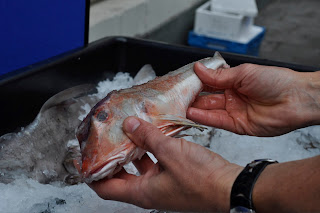 |
| Gurnard - a relatively sustainable fish |
 |
| Steve Simpson |
 |
| Steve Simpson talking to passers-by |
We had our marine biologist, Steve Simpson, on hand to talk to people about sustainable fish and how climate change is affecting what fish we should eat.
Big and little kids got involved by catching a fish from our small sea and finding out about and seeing the real fish from the seas around Britain.
The MCS Good Fish Guides about what fish to eat were very popular, as was the Fish Fight sign-up sheet from Hugh Fearnley-Whittingstall's campaign to end the wasting of by-catch.
We also had MSC certified fish products on show to let people know what to look out for when buying from the shops.
Here are some pictures from the day.
